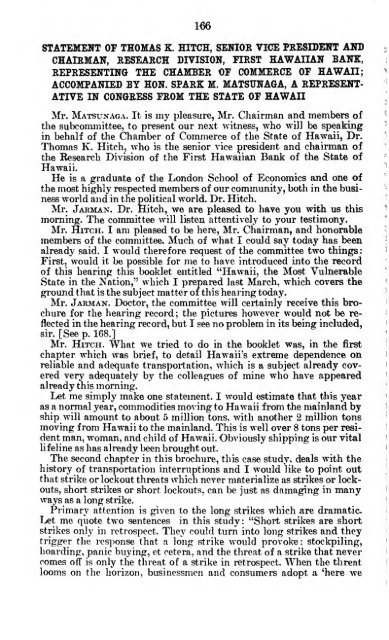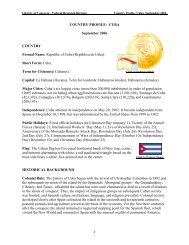1 - American Memory
1 - American Memory
1 - American Memory
Create successful ePaper yourself
Turn your PDF publications into a flip-book with our unique Google optimized e-Paper software.
STATEMENT OF THOMAS K. HITCH, SENIOR VICE PRESIDENT AND<br />
CHAIRMAN, RESEARCH DIVISION, FIRST HAWAHAN BANK,<br />
REPRESENTING THE CHAMBER OF COMMERCE OF HAWAH;<br />
ACCOMPAIHED BY HON. SPARK M. MATSUNAGA, A REPRESENT-<br />
ATIVE IN CONGRESS FROM THE STATE OF HAWAH<br />
Mr. MATSUNAGA. It is my pleasure, Mr. Chairman and members of<br />
the subcommittee, to present our next witness, who will be speaking<br />
in behalf of the Chamber of Commerce of the State of Hawaii, Dr.<br />
Thomas K. Hitch, who is the senior vice president and chairman of<br />
the Research Division of the First Hawaiian Bank of the State of<br />
Hawaii.<br />
He is a graduate of the London School of Economics and one of<br />
the most highly respected members of our community, both in the busi-<br />
ness world and in the political world. Dr. Hitch.<br />
Mr. JARMAN. Dr. Hitch, we are pleased to have you with us this<br />
morning. The committee w-ill listen attentively to your testimony.<br />
Mr. HITCH. I am pleased to be here, Mr. Chairman, and honorable<br />
members of the committee. Much of what I could say today has been<br />
already said. I would therefore request of the committee two things:<br />
First, would it be possible for me to have introduced into the record<br />
of this hearing this booklet entitled "Hawaii, the Most Vulnerable<br />
State in the Nation," which I prepared last March, which covers the<br />
ground that is the subject matter of this hearing today.<br />
Mr. JARMAN. Doctor, the conmiittee will certainly receive this bro-<br />
chure for the hearing record; the pictures however would not be re-<br />
flected in the hearing record, but I see no problem in its being included,<br />
sir. [See p. 168.]<br />
Mr. HITCH. What we tried to do in the booklet was, in the first<br />
chapter which was brief, to detail Hawaii's extreme dependence on<br />
reliable and adequate transportation, which is a subject already cov-<br />
ered very adequately by the colleagues of mine who have appeared<br />
already this morning.<br />
Let me simply make one statement. I would estimate that this year<br />
as a normal year, commodities moving to Hawaii from the mainland by<br />
ship will amount to about 5 million tons, with another 2 million tons<br />
moving from Hawaii to the mainland. This is well over 8 tons per resi-<br />
dent man, woman, and child of Hawaii. Obviously shipping is our vital<br />
lifeline as has already been brought out.<br />
The second chapter in this brochure, this case study, deals with the<br />
history of transportation interruptions and I would like to point out<br />
that strike or lockout threats which never materialize as strikes or lock-<br />
outs, short strikes or short lockouts, can be just as damaging in many<br />
ways as a long strike.<br />
Primary attention is given to the long strikes which are dramatic<br />
Ijet me quote two sentences in this study: "Short strikes are short<br />
strikes only in retrospect. Tliey could turn into long strikes and they<br />
trigger the response that a long strike would provoke: stockpiling,<br />
lioarding, panic buying, et cetera, and the threat of a .strike that never<br />
comes off is only the tlireat of a strike in retrospect. When tiie threat<br />
looms on the horizon, businessmen and consumers adopt a 'here we



![Albert Einstein Papers [finding aid]. Library of Congress. [PDF ...](https://img.yumpu.com/21604228/1/190x245/albert-einstein-papers-finding-aid-library-of-congress-pdf-.jpg?quality=85)





![American Colony in Jerusalem Collection [finding aid]. Library of ...](https://img.yumpu.com/17941275/1/190x245/american-colony-in-jerusalem-collection-finding-aid-library-of-.jpg?quality=85)



![Piccard Family Papers [finding aid]. - American Memory - Library of ...](https://img.yumpu.com/17941234/1/190x245/piccard-family-papers-finding-aid-american-memory-library-of-.jpg?quality=85)


